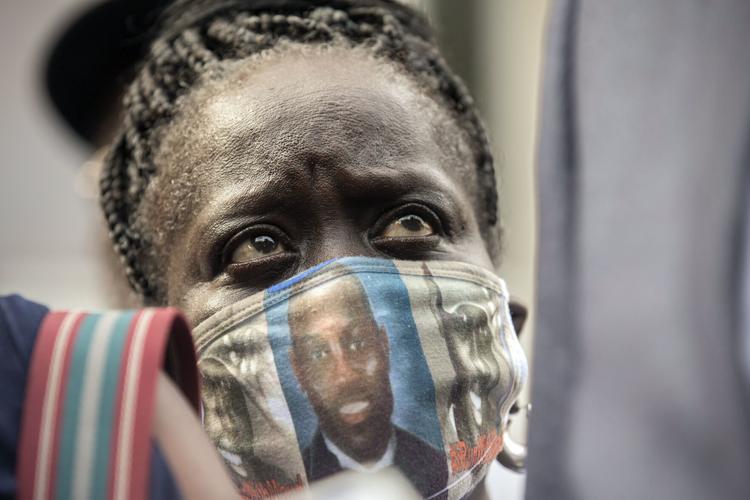Attorneys, sheriffs’ associations debate Georgia’s citizen’s arrest law

Ahmaud Arbery’s aunt, Kim Arbery, listens to family attorney S. Lee Merritt speak with reporters Thursday, June 4, 2020, in front of the Glynn County Courthouse after the preliminary hearing of Travis McMichael, Gregory McMichael and William Bryan in Brunswick, Ga. The three men are accused of shooting her nephew while he ran through their neighborhood in February.
(The Center Square) – Georgia lawmakers continued their review Thursday of the state’s citizen’s arrest law, which is facing scrutiny after the death of Ahmaud Arbery, who was killed after being suspected of a burglary.
Members of the House Judiciary Non-Civil Committee are trying to decide whether to repeal the current law or add a language to clarify a private person’s authority under the law.
Georgia law allows a civilian to arrest someone if he or she witnesses a crime or has “immediate knowledge” the offender has committed one. If the crime is a felony and the suspect attempts to escape, the law also allows any person to detain a suspect.
Some members of the committee are concerned that repealing the law could block business owners from detaining shoplifters or private citizens from protecting their property. Concerns also exist about the implications of the use of force that may be required to detain a person suspected of a crime.
During a committee meeting last week, Gwinnett County Prosecutor Danny Porter said the law states Georgians can use “reasonable force necessary to effectuate the arrest and to detain the individual.”
Pete Skandalakis, chairman of the Prosecuting Attorneys’ Council of Georgia, said Thursday that self-defense laws are different.
“We’re not talking about a merchant’s ability to detain a shoplifter, nor are we talking about defensive habitation or defensive others, self-defense, that’s not the issue here,” Skandalakis said.
Defensive habitation is a person’s right to use lethal force to protect his or her home.
Skandalakis, who has been an attorney for three decades, said he never has handled a case that involved the citizen’s arrest law. He thinks most prosecutors would not have an issue with the law being repealed, and adding specific language or a carve-out to the citizen’s arrest law would not affect other defense laws, he said.
Mazie Lynn Causey, a lobbyist for the Georgia Association of Criminal Defense Lawyers, said members of the association did not find any cases where the citizen’s arrest law was properly used and incidents usually end “badly.” The association is calling for the law to be repealed.
Waycross prosecutor George Barnhill cited the citizen’s arrest law as a reason not to pursue charges in February against the father-and-son duo of Gregory and Travis McMichael after the pair was caught on video following Arbery, who was jogging in a neighborhood near Brunswick. Travis McMichael shot and killed Arbery after a confrontation.
The McMichaels told police they were tracking Arbery after they spotted him on a construction site after a string of robberies in the Satilla Shores neighborhood.
The Georgia Bureau of Investigation concluded, however, the suspects never saw Arbery commit a crime. The district attorney, Barnhill, later recused himself from the case, and both McMichaels now are facing murder and aggravated assault charges.
Terry Norris, executive director of the Georgia Sheriffs’ Association, said lawmakers should consider making a distinction between detention and arrest in the legislation. The word detention is defined as the “lack of the ability to restrain movement from folks,” Norris said. “I think it is a more favorable term to the public.”
Still, Norris does not think the citizen’s arrest law should be repealed, but the public should detain a suspect and then immediately report the incident to law enforcement.
“Reasonable force” will be required to detain the suspect, and the law should dictate , Norris said. He also added if law enforcement does not pick up the suspect within 60 minutes, then the private citizen should release the suspect.
“So, in law enforcement, we depend on interactions with the community,” he said, “And, no, we don’t need them to do the job for us, but they are the eyes and the ears of every law enforcement agency in this country, so we need their participation.”

